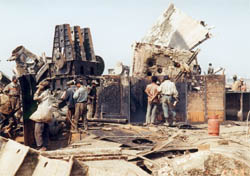Bangladesh paying high price as dumping ground for toxic wastes
A Greenpeace fact finding mission in its report titled ‘ The continuous vasion of the polluter pays principle ‘ revealed that hazardous waste continues to be illegally exported to Bangladesh as a result of the export of end-of life ships containing toxic substances and that Bangladesh is paying a high price to be the dumping ground for hazardous waste, says BSS. Ship-owners fail to take responsibility for the toxic substances on board of their end-of-life-ships and do not clean the ships before sending it for breaking in Bangladesh, said Eco Matser of Greenpeace Netherlands at a briefing at FEJB in Dhaka.Eco said that the first possible opportunity for the Bangladesh authorities to push for a global mandatory regime will be at the International Maritime Organisation’s General Assembly that meets in London next week. The IMO is scheduled to agree on voluntary guidelines on ship recycling. This will never prevent the illegal export of hazardous substances to Bangladesh.
The only logical solution to the ongoing environmental pollution is to make the ship owners responsible for not removing the toxic substances from the ships before they are exported to the ship breaking yards, he told journalists at FEJB. Greenpeace’s fact-finding mission this week at the Chittagong ship breaking yard revealed that hazardous waste is still dumped on Bangladesh.
Greenpeace found that the conditions and work methods at the yards are completely inadequate to address the problems associated with hazardous waste. At the ship breaking yards Greenpeace also saw that the inventory of hazardous waste, which should be presented by ship owners according to the existing voluntary guidelines, was not known at the Bangladeshi yards. Ship owners continue to decline their responsibility for the end-of-life-ships containing these hazardous materials. Instead of that ship owners pay for safe removal of the toxic substances on board of their ships they earn from sending their hazardous waste to Asia. The Greenpeace report shows that Bangladeshi breakers paid 271 million US dollar in 2001 to receive the old ships containing hazardous waste.
Recently the dumping of American navy vessels (so called MARAD “ghost fleet”) on the United Kingdom had drawn intensive media attention and public resistance in the UK and EU. It is appalling that even as the government of United Kingdom is quick to reject the import of the US MARAD ships in Britain the English ships containing the same toxic substances have been exported to Bangladesh without a single objection from the EU or UK authorities.
In Bangladesh Greenpeace documented this week the breaking of the “Hellespont Embassy”, an oil tanker from the UK. The USA should not dump its waste on the UK, equally the UK should not dump hazardous waste on Bangladesh. The English oil tanker is broken under very bad working and environmental conditions at open sea. This causes leakage of oil into the Bay of Bengal affecting the environment.
The need to stop export of hazardous waste with old ship is also reflected by recent court decisions in India. Turkey, Belgium and The Netherlands, pointed out Syeda Rizwana Hasan of BELA adding that these courts ruled that ships which have not been decontaminated should be considered as hazardous waste that cannot be imported or exported.
In Bangladesh, the court already issued a rule asking the government to show cause why the government should not act complying the Basel convention to which Bangladesh is a party. And why the operations in the ship breaking yard should not be carried according to the domestic law relating to the labour standard and the environment, she added (The Bangladesh Observer, 23 12. 03).
Top of page
Back to Environment
Back to Export
Back to Develoment Program
Home
